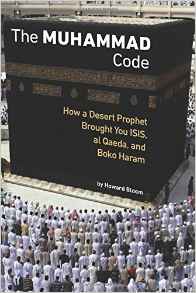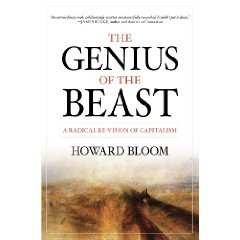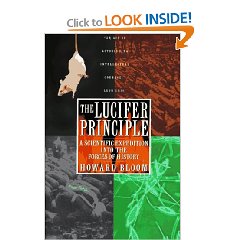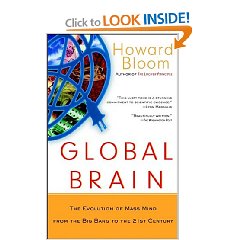
Howard Bloom
![]() A Worst Case Documentation of Islam as Evil
A Worst Case Documentation of Islam as Evil

Howard Bloom
![]() A Worst Case Documentation of Islam as Evil
A Worst Case Documentation of Islam as Evil

Howard Bloom
5.0 out of 5 stars CHALLENGING–Multi-Volume Story of Civilization's Soul in One Volume,August 26, 2012
I have been hooked on Howard Bloom's thinking since I read Global Brain: The Evolution of Mass Mind from the Big Bang to the 21st Century. I on to read his first book (The Lucifer Principle) and then found The Genius of the Beast: A Radical Re-Vision of Capitalism which has been one of the most popular reviews at Phi Beta Iota the Public Intelligence Blog (created so people can access my reviews within each of the 98 categories in which I read, something Amazon has never been willing to offer). And now we have this.
The raves first and then the nits.
RAVES:
At a time when the Catholic Church is grappling with secrecy versus the truth in dealing with the recurring global scandals of child molestation, and also grappling with theological truth versus scientific truth, this book could not be more timely.
If all of the very latest insights and innovations could be jumbled up in a blender with the history of civilization, this is what would come out once distilled to the essence.
The book strikes me as the answer to every Sunday crossword puzzle every invented, revealing the solutions to each one at a time in a manner seems totally perfect.
Potentially a paradigm / mind-set / game changer of a book.
Continue reading “Review: The God Problem – How A Godless Cosmos Creates”
What: A Roaring Rant With Howard Bloom–A Reality Sandwich Salon
When: November 20, 2009, 7 pm
Where: Collective Hardware, 169 Bowery, Manhattan
Who: YOU! Open, just show up.
The Genius of the Beast: A Radical ReVision of Capitalism comes to life when Howard Bloom blasts the stage. Says the Village Voice, “machine-gun raconteur scientist (and ex-PR magnate to the stars) Howard Bloom .” is a ““speaker of incendiary mercurial intellect.” Bloom's first NYC roaring rant in four years. Don't miss it.
Emceed by Reality Sandwich founder Daniel Pinchbeck, who disagrees with Bloom about EVERYTHING.
Forget sparks. Minds will fly!
____
Howard Bloom is the author of the spanking new book The Genius of the Beast: A Radical ReVision of Capitalism (“exhilaratingly-written and masterfully-researched. I couldn't put it down.”–James Burke); not to mention The Lucifer Principle: A Scientific Expedition Into the Forces of History (“mesmerizing”-The Washington Post); Global Brain: The Evolution of Mass Mind From The Big Bang to the 21st Century (“reassuring and sobering”-The New Yorker): and How I Accidentally Started The Sixties (“a monumental, epic, glorious literary achievement.” Timothy Leary).

The author gifts us with a counter-culture manifesto that resurrects the goodness of capitalism while also connecting to the roots of humanity, of the human soul as a microcosm of the soul of society.
Be patient, the first third of this book will amuse, enlighten, & provoke, at which point it will grab you by the throat and shake your fundamental perceptions of life. The author is compelling in both a scientific sense, weaving psychology, biology, economics, and sociology together; and in an artistic sense, delivering theater of the mind, new visions, poetic turns of phrase page after page, and a massive amount of purpose-laden provocative minutia, all of which culminates in blinding flashes of insight that explain the mind-expanding role of circuses, the failure of religion, and the natural cycles of fission and fusion, splintering apart and coming together.
Continue reading “Review: The Genius of the Beast–A Radical Re-Vision of Capitalism”
The right to self-defense – perfect.
But I'd like to ask: Do the Palestinians also have the right to self-defense?
We probably wouldn't admit it out loud, but in our heads we would say – again, in one voice – “No!”
This is the Israeli notion of a fair deal: We're entitled to do whatever the hell we want to the Palestinians because, by definition, whatever we do to them is self-defense. They, however, are not entitled to lift a finger against us because, by definition, whatever they do to us is terrorism.
Continue reading “Journal: Chuck Spinney Flags Moral Clarity Israeli Style”

![]()
Leon Uris is quoted on the cover as saying that this book is “an act of astonishing intellectual courage,” and I will say that the author has pulled together an extraordinary collage of details in an intricately assembled “story” in which he challenges the assumptions of a number of major conventional intellects. There are 58 “parts” to this book, each part between two and six pages long, with an astounding array of multi-disciplinary quotes and footnotes. No scared ox goes ungored.
Some of the history in this book, of the origin of Mohammed as a possible lunatic and then a vengeful warrior using religion to grab real estate, and of the early split between Sunni and Shiite over the issue of the succession, is very useful today.
The author centers the disparate and very broad-ranging pieces of the book on three core ideas: Earth as a superorganism within which a tribe or religion is itself a superorganism; memes as unifying ideas that create us versus them for the sake of changing the pecking order and feeding off weaker tribes, and–in the only optimistic note in the book, at the end, of collaboration and information sharing as the only means to break out of the pattern of dog eat dog.
He specifically slams religion, and especially fundamentalist religion, as a false god that substitutes faith for control, and as a tool of controlling elites who need to keep the impoverished masses from waking up to the raw fact that masses of people can indeed “take over” factories and estates.
On page 94 the following quote struck me as applying equally to George Bush and Osama Bin Laden: “Leaders like Orville Faubus and Fidel Castro have skillfully manipulated a few basic rules of human nature: that every tribe regards outsiders as fair game; that every society gives permission to hate; that each culture dresses the demon of hatred in the garb of righteousness; and that the man who channels this hatred can rouse the superorganism and lead it around by the nose.”
There are numerous gifted phrases throughout this book, and I can understand the frustration of some in absorbing this dizzying array of data points, but it is surely worth making the effort.
He makes much of the evolution of the brain from reptile (survival) to mammalian (social) to primate (individual) and emphasizes that even the most advanced humans still have all three brains in some form, with the lower forms subject to arousal.
Overall I rate this book one of the ten most useful books relevant to understanding and defeating radical Islam, which the author says is “a meme growing ravenous,” a sleeping giant that has been awakened. He goes back in time to look at how the US, in forcing the French and English to give up the Suez Canal, actually helped inspire Arabia to plan for a day when the West might be sent packing. Similar, the first Gulf War, when the Coalition defeated Iraq, undermined secular Moslem regimes, and further inspired Islamic fundamentalists.
In the author's view we erred gravely in not understanding the asymmetric scope of the threat of Bin Laden and post-Taliban Afghanistan, and we appear to have erred in a truly gigantic way in not seeing that the second Gulf War was in fact doing Iran's bidding and accomplishing something Iran could never have done on its own. The author views Bin Laden as having replaced Russia as a “friend” to the Third World, and anticipates both a rapid spread of Islam among the poor, and a plague of animosity toward to the USA specifically.
The book includes a fascination discussion of psycho-social aspects of nations and tribes and other social groups including religions. While some have been derisive of his discussion of “pecking orders” I believe–having lived overseas most of my life–that he nails it. Not only does instability cause the accepted pecking order to go out the window, but prosperity actually destabilizes established pecking orders. When we eventually implement the grand vision of Jeffrey Sachs (see my review of “The End of Poverty” we will need to be very mindful of the animal force that will be unleashed at the same time, and not make the mistake we made in Iraq, of failing to plan for stabilization and reconstruction.
The last two ideas in this book that really grabbed me are from page 292, on how America began a perceptual shut-down and decline from 1973 onwards, culminating in the cheating culture and lazy obese children and parents that are the bane of most teachers' lives today. America is in “slow” mode and has lost its competitive drive.
The book was hugely ambitious, and it is easy to be snide, as some reviewers are, but I for one found this as close to genius and as close to breath-taking intellectual derring-do as any book I have read in a while. If America is to survive the multiple threats to the Republic, it will take leaders capable of reading and understanding this book, and implementing a 100 year strategy for winning the six front war, beginning on the home front with a draconian reform of our educational and information sharing and distance learning environment.

5 out of 5 Stars
Live and Let Die Group Dynamics, Bacteria Are Winning
July 13, 2001
Very very few books actually need to be read word for word, beginning with the bibliography and ending with the footnotes. This is one of those books. While there are some giant leaps of faith and unexplained challenges to the author's central premises (e.g. after an entire chapter on why Athenian diversity was superior to Spartan selection, the catastophic loss of Athens to Sparta in 404 BC receives one sentence), this is a deep book whose detail requires careful absorbtion.
I like this book and recommend it to everyone concerned with day to day thinking and information operations. I like it because it off-sets the current fascination with the world-wide web and electronic connectivity, and provides a historical and biologically based foundation for thinking about what Kevin Kelly and Stuart Brand set forth in the 1970's through the 1990's: the rise of neo-biological civilization and the concepts of co-evolution.
There are a number of vital observations that are relevant to how we organize ourselves and how we treat diversity. Among these: